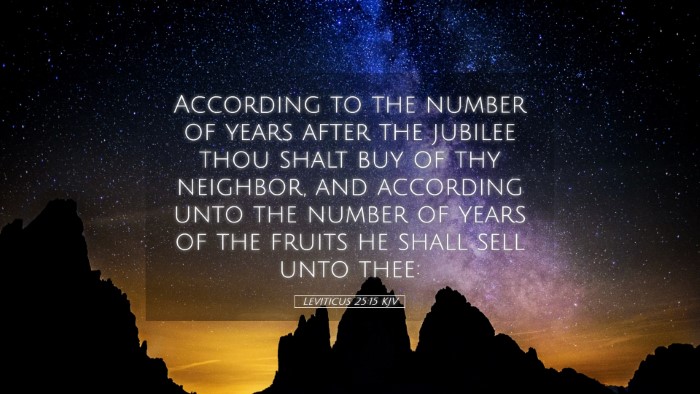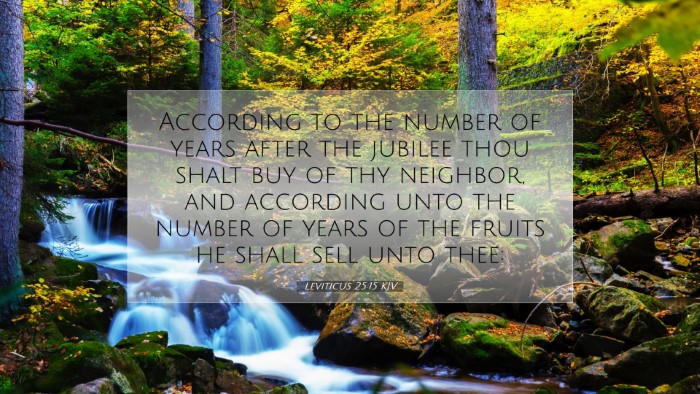Commentary on Leviticus 25:15
Verse: "According to the number of years after the jubilee, thou shalt buy of thy neighbour, and according unto his years of the fruit he shall sell unto thee."
Introduction
The book of Leviticus contains much of the Mosaic Law and is quite significant for understanding the holiness of God and the moral/ethical implications of His covenant with Israel. Leviticus 25 discusses the laws governing the sabbatical year and the Year of Jubilee, emphasizing themes of redemption, rest, and social justice. This commentary focuses specifically on Leviticus 25:15, examining its theological implications and practical applications, particularly in relation to the socio-economic regulations provided in the Law.
Theological Insights
1. Divine Provision and Sovereignty:
- Albert Barnes notes that the land ultimately belongs to God, and the Israelites are merely tenants. This underscores God's sovereignty over His creation.
- Matthew Henry emphasizes that the laws regarding property stress that all provisions come from God's hand, suggesting that material wealth is not absolute but is entrusted by God for stewardship.
2. Social Justice and Equality:
- Adam Clarke highlights that the regulations in this verse promote social equality and justice. By allowing the wealth and property to revert during the Jubilee, God protects the marginalized and underprivileged, ensuring that no one remains impoverished permanently.
- The system of purchasing land according to its yield rather than its market value creates a protective measure against exploitative practices.
Exegesis of the Text
Leviticus 25:15 outlines the principle of valuation based on the years that remain until the next Jubilee. This practice reflects the larger concept of redemption and restoration integral to the Israelite way of life.
1. Concept of the Jubilee Year:
- The Jubilee, occurring every fifty years, was a time for resetting the societal structures of Israel. Borrowed property was returned, and families regained their ancestral lands, embodying God’s desire for restoration (Barnes).
- This verse articulates a framework whereby economic transactions are not merely profit-driven but are anchored in a divinely instituted rhythm of rest and restoration.
2. Consideration of Seasons and Time:
- The buying of land based on the years until the Jubilee reflects an understanding of agricultural cycles and profit cycles. Matthew Henry elucidates how this ensures fairness in transactions, preventing economic exploitation.
- This principle directs us to consider the temporal aspect of our decisions—whether in business or ministry—as we participate in God’s redemptive narrative.
Practical Applications
For contemporary believers, the implications of Leviticus 25:15 extend beyond ancient Israel into modern economic practices and community relations.
1. Ethical Economic Behavior:
- Church leaders and congregants alike must consider how economic practices reflect their faith. Engaging in fair business practices that honor the dignity of every individual aligns with biblical principles.
- Pastors might address issues of economic disparity in their communities, advocating for systems that reflect God’s provisions and justice as illustrated by this verse.
2. Creating a Culture of Generosity:
- The Jubilee principles instill a mindset of generosity and community support, inviting believers to share resources and support those in need.
- Building a community where assistance and support for the vulnerable are prominent echoes the heart behind the Jubilee, demonstrating love in action.
Conclusion
Leviticus 25:15 serves as a profound reminder of God's desire for justice, equity, and the ethical responsibility we bear as stewards of His creation. By understanding the significance of this verse in its historical context, we can apply its principles in contemporary life, advocating for fairness in economic systems and actively engaging in restorative practices within our communities. The insights from Matthew Henry, Albert Barnes, and Adam Clarke urge us to embody these principles as we seek to reflect God's character in our interactions and societal structures.


